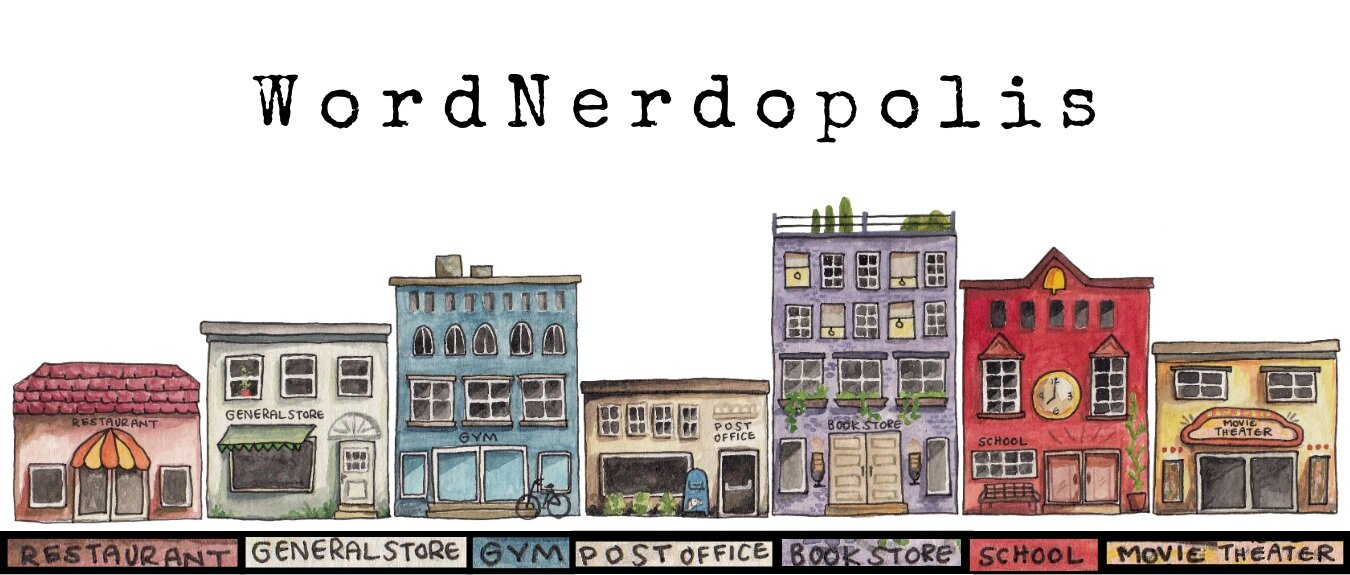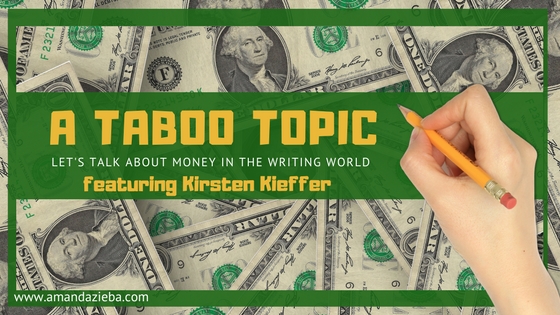A Taboo Topic: Let's Talk About Money in the Writing World
Money is one of those taboo subjects we are taught (through experience) not to discuss. Like religion and politics, money, is seemingly too private and polarizing to discuss in public, and sometimes even with those closest to us. And while society might have put those rules in place for good reasons, I’m not sure that it really helps us as humans or citizens, and especially not as entrepreneurs. Believe me when I say that these days, being a writer, is being an entrepreneur, or as I like to call it author-preneur.
Fortunately, I did not grow up in a household of people that held their tongues on the subject of money. And for this I am incredibly grateful. My parents often talked to my sister and me about money. About how much things cost, and how much time it took to earn certain amounts of money. I specifically remember conversations about why and when cars were purchased. I distinctly remember working for my parents at the going rate of $10 an hour to pay off, pay back or save up for items in my teens and even my twenties. It was through my parents that my husband and I came to be faithful Dave Ramsey disciples. My dad and I still have lengthy conversations about finances; he will share his retirement and real estate plans and I will talk through my savings plan for vehicles, vacations and vocational dreams.
This investment of financial knowledge has set me up to create a successful career as an author-preneur… because I am not afraid of money.
It is with this mindset that I approached Kristen Kieffer, creator-writer-and-human extraordinaire, of the fictional storytelling website: Well-Storied.
I have used Kristen’s self-created resources on a number of occasions and always find myself coming back to her and her site for great craft articles and workbooks. (My favorite is: The Pre-Write Project… which I have used personally, and also with my students in my ELA classes.) The last time I went to Kristen’s site though, I noticed something new. Instead of a fixed price for each resource, there was a sliding scale of prices. Consumers were prompted to, PAY WHAT THEY CAN, with options ranging from one dollar to a million. (Well I don’t know if a million dollars was on the scale, but really, the sky is the limit and I’m sure Kristen would appreciate the gesture.)
This was something new and interesting. I decided I needed to hear more about it, and when I approached Kristen with a list of questions, she was more than a little happy (excited! ecstatic!! thrilled!!!) to respond. This topic is very near and dear to her heart and I am honored to help her spread her mission.
How did this idea of “pay as you can” evolve?
Growing up, money was tight in both my family and my community. I had privilege, and plenty of it, but there were also times when I missed out on opportunities that could have fostered my creative interests because the bills needed to get paid or because the school district took yet another budget cut that hurt creative programs. When I was a pre-teen, my local library flooded for the third time in five years. The town decided they were tired of pouring money into repairs and shut the library down for good. More than a decade later, my childhood community still lives without such a pivotal public resource.
As a consequence of all these experiences, I grew up keenly aware that the arts are one of the first things to go when a budget gets tight. Yet when art thrives, community thrives. Society thrives. And so rather than mourn or begrudge this reality, I wanted to do something about it. I wanted to ensure that, at Well-Storied, there were no barriers to entry for learning or self-improvement. I believe opportunity to be a human right, and though it's a small step, I wanted to give every Well-Storied reader the opportunity to foster their love for writing no matter their age, income, or background. We all have stories to tell. They only need to opportunity to thrive.
Writing and publishing can feel like a closed-door industry... not out of intention, but out of saturation and other factors. Your mission seems to be in direct contrast to that. What are your thoughts on this?
I once had someone email me to say that I should not be writing a blog about writing, as I haven't yet been published. "It's like driving a car without taking a road test," they said. "You can see how dangerous this is, right?"
There was a (large) part of me that grew angry at this person's words, but there was also a niggling voice at the back of my mind that reminded me of the truth: I knew why that person said those words. I knew their beliefs had been socialized into them.
In the Western world, we've devalued the arts to a place where they are nothing if they cannot be exploited. If there's not a profit to be made from your creative work, then your creative work isn't real. It isn't valid. Go get a real job. Stop wasting your time with that silly hobby. From day one, we're taught this. Even our children are asked, "What do you want to be when you grow up?" rather than "What hobbies do you enjoy?".
I'm a firm believer that publishing is not a validation of one's worth as a writer or storyteller. Do you love to write? Are you writing? You are a writer. Truly, it's as simple as that. And if I can foster that surety in other writers, if I can convince just one more creative not to dim their shine in the name of striving for validation they already have within themselves, then there are no lengths to which I would not go to make that happen. The pay-what-you-can program is just one more way for me to make that belief accessible to all.
Have you experienced barriers in the writing world and did they influence your decision to model your business this way?
In a way, I wish I could say I had. Experiencing barriers, at times, feels like a rite of passage in one's publishing journey. We all face hardship in the pursuit of our dreams, some more than others, and though these barriers may not be fun or even fair, they are our reality.
But as I haven't yet moved toward publishing (I'm only six years into my writing journey and am just beginning to find a measure of confidence in my work's publishing potential), I haven't yet had the pleasure of countless rejections or publishing biases. The decision to move forward with the pay-what-you-can program was born solely out of the desire to invest in the community of writers who had already given so much to me.
Did anyone tell you this was a poor business decision and try to talk you out of it?
Only myself. Haha! I certainly had my doubts when kick-starting this program. Being self-employed, I've read a lot about how freelancers and small business owners should charge more for their goods and services than they often do. I think many creatives, myself included, suffer from Imposter Syndrome and believe that if they don't make their products ultra-affordable, they'll never make sales.
I agree with the sentiment that creatives should know their worth and charge for it, but the pay-what-you-can program was never about making Well-Storied workbooks and offerings affordable. It was about making them accessible. Semantics, perhaps, but I believe this matters. What is affordable to some may not be affordable to others, so where does one draw the line when crafting their prices?
At Well-Storied, I try to teach the foundations of good writing, storytelling, and creative living so that writers of all ages, backgrounds, and incomes can make the most of their love for writing. I don't want a price tag to drive anyone away from doing what they love, so it's people over profit for me. We all thrive when we lift one another up.
How long has this been your model? How is it going?
I launched the pay-what-you-can program in the summer of 2017, and it's been a huge and humbling experience in my business journey. My fear of a large drop in income quickly proved unfounded. Instead, the program brought new and exciting connections with Well-Storied's readership. Writers in strong financial positions rallied around the program, supporting it through Patreon, Ko-Fi, and workbook downloads made at recommended purchase price (and beyond!), while I grew to know many writers who benefited from the program when they reached out to share their appreciation.
That said, the program isn't without its trials. The biggest blip came in the new year, when Well-Storied's monthly readership began to climb. This, of itself, was very exciting. Unfortunately, over the months to come, the ratio of writers who downloaded Well-Storied's resources at no charge grew wildly out of proportion. It became clear that a new wave of website visitors were abusing the program, which had worked with little trouble for more than half a year. This, in turn, began to make the program unsustainable.
After a lot of deliberation and conversation with the Well-Storied patrons who support the pay-what-you-can program, I decided to increase the minimum purchase price for all resources from $0 to $1.00 this April. This prevented those who would take advantage from further abusing the system, while still maintaining accessibility for writers of nearly any income bracket. In many ways, I was saddened to make this change, but the Well-Storied community was very supportive of it. I'm forever grateful for that.
Anything else you want to share that hasn’t already been covered?
As you can see, I get a weeeee bit passionate about this topic. If there's anything you would like me to expound upon, I would love to share. Just give me a shout-out via email.
A side note from me. While at UntitledTown last month, I attended a session called: Strange Bedfellows – Coalitions among communities, businesses and the art. I asked the panel about a pay-as-you-can strategy and if they had any experiences, good or bad, with it as a business model. Jerod Stanek, Write On Door County’s director had this to say, “We used the pay as you can model for some of our celebrity reading events. We gave a suggested donation price at the door. Some people put in nothing, while others put in $100. We believe that at the end of the day, it all evened out to roughly the same amount as we would have collected had we charged everyone the same price. And this way, everyone who wanted to attend, could.” The Write On Door County organization went even one step further and offered transportation to and from the event as well. Bravo Jerod and Co!
Well, that’s it for another Writing Wednesday. Thank you Kristen for sharing your time, energy and passion with our word nerd community. Thank you also to everyone who stopped by my blog today. You are welcome back, every Wednesday, for more writing tips, techniques, information on the writing world and general word-nerd awesomeness. To sign up for my eNewsletter and get a free writing prompt PDF: click here!





